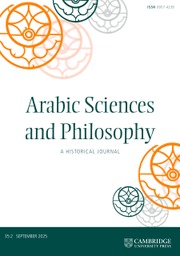Article contents
SOME QUESTIONS REGARDING AVICENNA'S THEORY OF THE TEMPORAL ORIGINATION OF THE HUMAN RATIONAL SOUL
Published online by Cambridge University Press: 01 March 2008
Abstract
In Avicenna's expositions of his theory of the temporal origination of the human rational soul, its ḥudūth, one meets difficulties in understanding of what he actually means. Some of the expressions used are left unexplained and one has to extract their meaning from discussions given in a different context. There are also ambiguities in his use of such terms as al-‘aql al-kulliyy (the universal intellect) and al-nafs al-kulliyya (the universal soul). Although in one place he makes it clear that these expressions refer to concepts that exist only in the mind, distinguishing them from ‘aql al-kull (the intellect of ‘the whole [universal]') and nafs al-kull (the soul of ‘the whole [universel]'), the distinction is not uniformly observed. In a number of his works the term ‘‘universal'' is used to refer to both the celestial intellect and the celestial soul. There is also an ambiguity in his statements about the role the celestial soul plays in the emanation of the human rational soul. In some discussions he seems to hold that the rational human soul emanates from both the celestial intellect and the celestial soul. The Metaphysics of al-Shifā' (The Healing) suggests a resolution of this ambiguity. At the same time, there are statements in this work that are left unexplained and one has to look for their explanation in other books of The Healing. Thus questions do arise regarding the details of Avicenna's theory of the temporal origination of the human rational soul. His general exposition of his theory, however, remains comprehensible, its pivotal position within his entire philosophical system clear.
- Type
- Research Article
- Information
- Copyright
- Copyright © Cambridge University Press 2008
- 5
- Cited by


